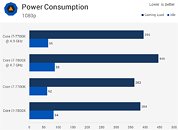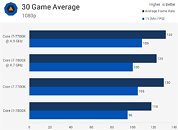Tuesday, July 18th 2017

Benchmarks Find Intel Core i7-7700K Better Than i7-7800X for Gaming
Over at Techspot, Steven Walton managed to get a hold of Intel's new six-core, 12-thread Core i7-7800X CPU, and chose to take it for a spin over a levy of gaming benchmarks. The results don't bode particularly well for Intel's new top i7 offering, though: it is soundly beat by its smaller, svelter brother in virtually all gaming tasks.
Out-of-the-box results are somewhat in line with what we would expect: the Core i7-7700K does bring about a base clock increased by 700 MHz compared to the i7-7800X (4.2 GHz vs 3.5 GHz), and has a higher boost clock to boot (4.5 GHz vs 4 GHz.) And as we've seen over and over again, including with Intel rival AMD's Ryzen offerings, frequency usually trumps core count when it comes to performance when applications are exposed more than four cores. And this leads to Walton's results: the Core i7 7700K is still king in pure FPS terms, coming in with a much more attractive proposition than the 7800X in both minimum and maximum FPS, as well as power consumption.Now, to be fair, most of us were probably expecting that: consumer application optimization for high core-count processors (if we can actually call a six-core a high core-count processor in a soon to be Threadripper-infused world, but I digress) is sorely lacking. However, what really paints Intel's i7-7800X in a bad light is that its performance continues to be lacking even when it has a frequency advantage over the 7700K. As you can see in the performance metrics, a Core 17-7800X overclocked to 4.7 GHz (with a 500 MHz advantage over stock clocks of the 7700K and 200 MHz over its Boost clock) still performs slower than it. The stock 7700K has 5% higher minimum and maximum framerates than the 7800X, despite being clocked lower, having a ridiculously lower amount of L2 cache, and having about the same total L3 cache (which actually results in an about 30% lower available L3 cache per core.) And these lower frame rates are delivered with a 41% higher idle power consumption, and 23% higher gaming power consumption. Check the source link for some detailed benchmarks. As for all this, it seems that while Intel likes to take digs on AMD for their "glued-together" desktop dies repurposed for servers, Intel's 7800X, which has its cache hierarchy and core interconnect re-architected for servers, may be little more than a repurposed server CPU for the desktop crowds...
Source:
Techspot
Out-of-the-box results are somewhat in line with what we would expect: the Core i7-7700K does bring about a base clock increased by 700 MHz compared to the i7-7800X (4.2 GHz vs 3.5 GHz), and has a higher boost clock to boot (4.5 GHz vs 4 GHz.) And as we've seen over and over again, including with Intel rival AMD's Ryzen offerings, frequency usually trumps core count when it comes to performance when applications are exposed more than four cores. And this leads to Walton's results: the Core i7 7700K is still king in pure FPS terms, coming in with a much more attractive proposition than the 7800X in both minimum and maximum FPS, as well as power consumption.Now, to be fair, most of us were probably expecting that: consumer application optimization for high core-count processors (if we can actually call a six-core a high core-count processor in a soon to be Threadripper-infused world, but I digress) is sorely lacking. However, what really paints Intel's i7-7800X in a bad light is that its performance continues to be lacking even when it has a frequency advantage over the 7700K. As you can see in the performance metrics, a Core 17-7800X overclocked to 4.7 GHz (with a 500 MHz advantage over stock clocks of the 7700K and 200 MHz over its Boost clock) still performs slower than it. The stock 7700K has 5% higher minimum and maximum framerates than the 7800X, despite being clocked lower, having a ridiculously lower amount of L2 cache, and having about the same total L3 cache (which actually results in an about 30% lower available L3 cache per core.) And these lower frame rates are delivered with a 41% higher idle power consumption, and 23% higher gaming power consumption. Check the source link for some detailed benchmarks. As for all this, it seems that while Intel likes to take digs on AMD for their "glued-together" desktop dies repurposed for servers, Intel's 7800X, which has its cache hierarchy and core interconnect re-architected for servers, may be little more than a repurposed server CPU for the desktop crowds...


136 Comments on Benchmarks Find Intel Core i7-7700K Better Than i7-7800X for Gaming
It's really pathetic from Intel. I am waiting for the 6 cores on consumer lga!!!
But what is the news in this for gaming it is GHz over cores as usual... that is what AMD is NOT getting....
In other news, half life 3 doesn't seem to come out soon.
Too bad they didn't include the comparison of the 7800X overclocked VS the 7700K stock.
- cores are useless when unused;
- two threads can run just fine on one core if combined they don't push it over 100% and don't need more than the available cache;
- it's nice to know the boost speed, but guess at which speed the CPU runs when several cores are used for prolonged periods of time?
Intel's strategy is not even surprising, I'm pretty sure they could have added more cores for years, they just weren't motivated to do it. Now with Zen out they're finally adding those (low hanging fruits) while probably scrambling for a new architecture in the background - to be released in a year or, more likely, two.
In almost every comparison I've seen the HEDT CPUs weren't any better than the consumer CPUs for gaming. Total waste of money if trying to improve framerate. They're better for heavily multitasking scenarios. I'm surprised that here it fails even with a clock advantage. @Raevenlord are they the same architecture?
Oh and Intel claims an improved manufacturing process, but since we can't measure that...
Benchmark just for comparison but the real life maybe they would be the same since just few can utilize it to the max
Wow, that really says it all.
I agree, technically its not a straight rebrand, but this is like a new VW Golf release - you get your car lights in a different shape, they updated the styling a bit, and add a fancy letter on the back so it seems to go faster. If you pick a Diesel, you get the cheating engine for free. (Couldn't resist)
Perhaps they will show a SLI benchmarks where the extra pci-e lanes of skylake-x will offset the dismal gaming performance, but I won't hold my breath.
AMD is also guilty of taking a 'step back' with there insane Vega power consumption.
The Mesh network is running at 2.4 GHz compared to the Ring Bus at 4 GHz. A few people in the Tech Spot comments section suggested overclocking the Mesh from 2.4 GHz to 3.0 GHz.